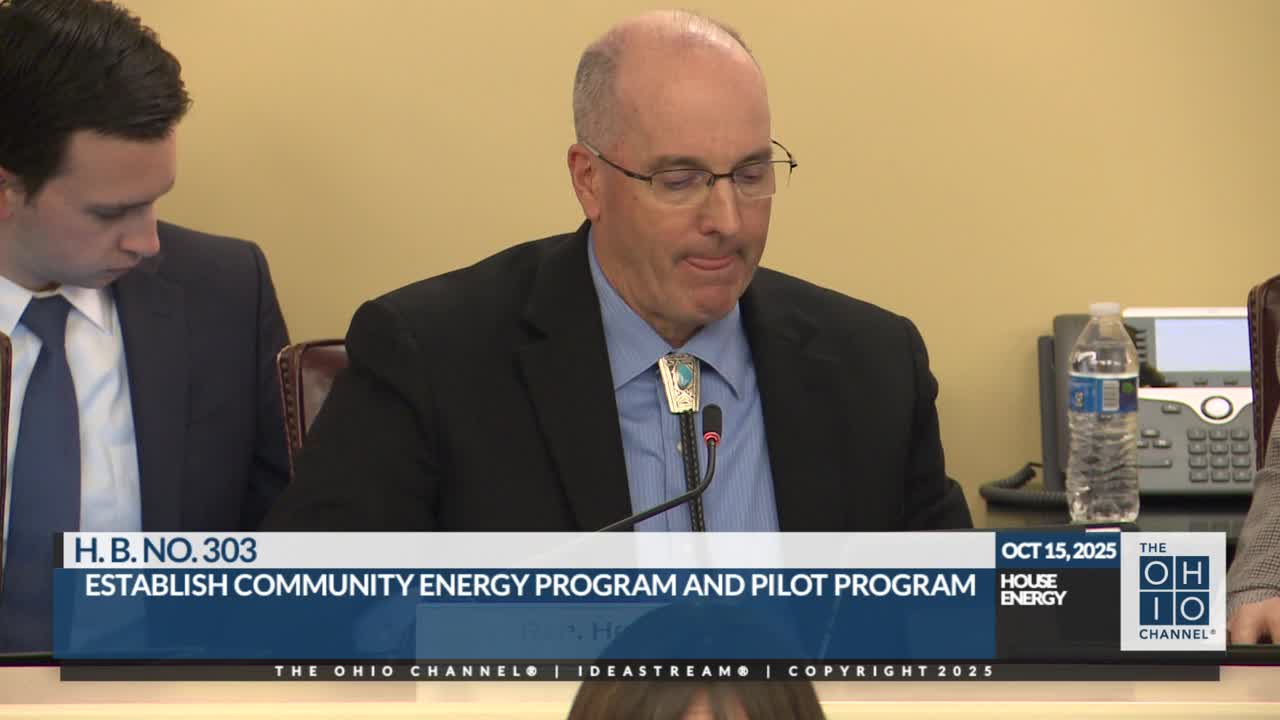Consumers' counsel warns HB 303 could shift costs to nonparticipants; conservative group praises growth but objects to local veto power
Get AI-powered insights, summaries, and transcripts
Subscribe
Summary
The House Energy Committee held a third hearing on House Bill 303, a community energy pilot program that would allow multiple subscribers to share the output of local energy projects and receive bill credits on their utility bills.
The House Energy Committee held a third hearing on House Bill 303, a bill to create a community energy pilot program that would allow multiple subscribers to share output from local energy projects and receive bill credits. Maureen Willis, director of the Office of the Ohio Consumers' Counsel (OCC), testified as an interested party and urged stronger guardrails to prevent costs from shifting to nonparticipating residential and small business customers.
OCC's central concern is that the bill allows uncapped bill credits tied to a utility's retail rates — including generation and transmission — and gives broad discretion to the Public Utilities Commission of Ohio (PUCO) to set credits “at a reasonably compensatory level to create a financeable community energy market,” language Willis described as a potential mechanism for cost shifting. Willis told the committee that if bill credits are set higher than the demonstrable system benefits, nonparticipants could ultimately fund subsidies for subscribers.
OCC asked the committee to require the developer and PUCO to demonstrate, on a utility‑by‑utility basis, the actual avoided costs and benefits before credits are set; to limit the duration or scope of any pilot with a clear sunset; and to add caps or other guardrails to protect affordability. Willis said unsubscribed credits could be banked for up to 12 months under the bill as drafted, which increases exposure for nonparticipating customers.
Several representatives asked how large the pilot would be in practical terms. Committee discussion noted the bill sets aside 1,500 megawatts for the pilot and contended that the program could serve on the order of tens of thousands of homes in a year; Willis said the pilot's intent and reporting are not sufficiently tied to enforceable outcomes and recommended a clear, time‑limited sunset and a requirement that the PUCO base credits on verifiable avoided costs.
The committee also heard from Shana Fritz, executive director of the Ohio Conservative Energy Forum, who testified in support of HB 303's market‑oriented approach to expand community energy and consumer choice. Fritz praised the bill’s aim to encourage local investment and a diverse energy portfolio but asked that township trustees be involved through structured comment and zoning review rather than given unilateral authority to prohibit compliant projects. She warned that a local veto would create investor uncertainty and potentially discourage investment and jobs in rural communities.
No floor or committee vote was taken on HB 303. Committee members signaled interest in amendments — including possible caps, clearer processes for PUCO review, a sunset or reporting requirement tied to legislative review, and more transparent demonstrations of avoided costs — before any final action.
